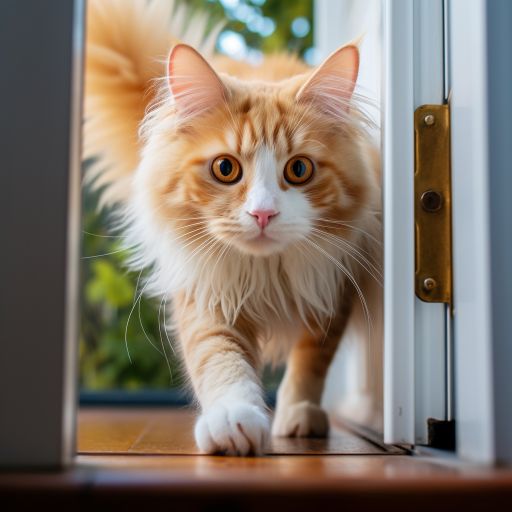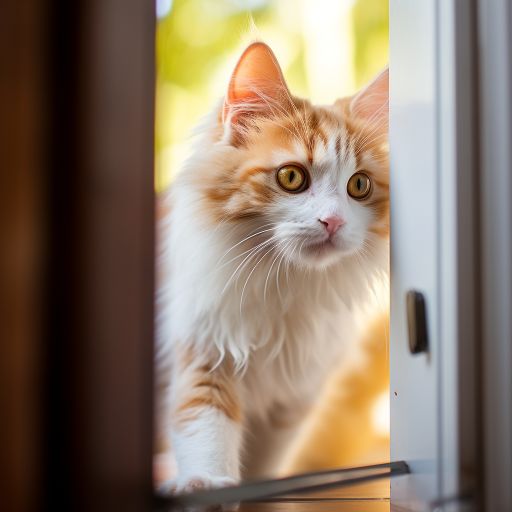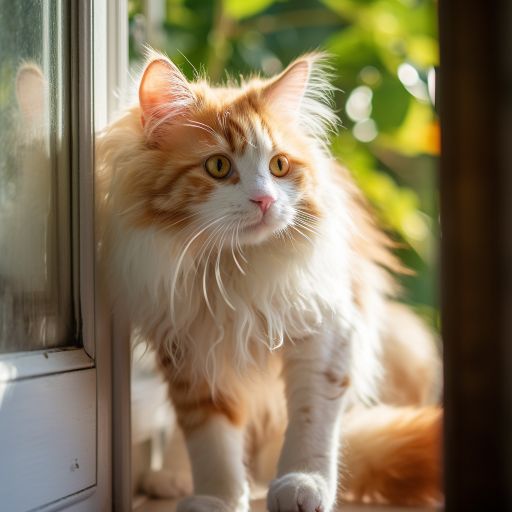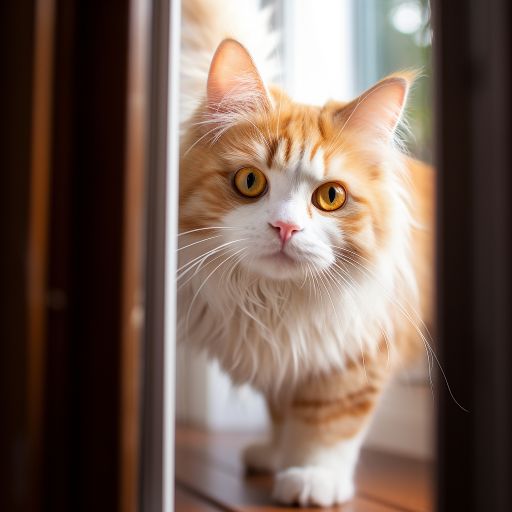Cats Love Being Petted
As cat lovers, we often find ourselves wondering if our feline friends enjoy being petted. After all, some cats seem to love being petted, while others will shy away from the human touch. In this comprehensive guide, we will explore the topic of feline affection and help you understand if cats like to be petted.
Live Pee Free! Odor Eliminator 100% Eliminates Pet Odor on Contact. 20% Off. No Enzymes, No Fragrance, No Detergent, No Bleach – Safe for Kids and Pets.Purrs and Pleasures
Table of Contents
Introduction: The Feline Affection Connection
Cats are often perceived as aloof or independent creatures. However, many cat owners will tell you that their feline friends thrive on affection, particularly in the form of petting. But why do cats love being petted so much? Cats Love Being Petted. Exploring this topic reveals a deeper understanding of feline behavior, as well as the relationship between humans and their beloved pets. In this blog post, we will unveil ten surprising reasons why cats adore being petted, and how these moments of intimacy strengthen the bond between cats and their humans.
1. Evolutionary Bonding: A Survival Instinct
Cats have evolved over thousands of years alongside humans. Understanding this evolution is crucial to grasping why they enjoy being petted. In the early days of domestication, apex predators, such as cats, started to seek out human companionship for safety and sustenance. Cats Love Being Petted. This mutualism set a foundation for an affectionate relationship based on trust, highlighting the importance of petting as a form of bonding that dates back to their ancestors.
Moreover, petting reinforces this bond in modern times. When humans pet their cats, they often imitate social grooming behaviors seen in feral feline populations. This gentle act not only comforts cats but also cultivates a feeling of safety, allowing them to thrive emotionally and mentally in their home environments. Cats Love Being Petted. Thus, petting serves as a reminder of their historical connections to humans.
2. Comfort and Security: The Safety Zone
The act of being petted can evoke a sense of comfort and security in cats. When you stroke their fur, they often relax, positioning themselves in ways that demonstrate utter trust. This feeling is vital for their well-being, as cats are innately wired to be cautious creatures. Cats Love Being Petted. The familiarity of being petted signals to cats that they are in a safe environment, free from threats, and can let their guard down.
Furthermore, petting is a multi-sensory experience for cats. The rhythmic strokes and gentle pressure of your hand against their fur create soothing sensations that can mimic those received from their mothers during kittenhood. Cats Love Being Petted. Positive touch forms a critical part of their early developmental stages; thus, even as adult cats, they seek that comfort through petting, reinforcing their security and trust in their human companions.
3. Social Grooming: A Hierarchical Necessity
Social grooming, or allogrooming, is not only common among wild felines but is also an integral part of domesticated cats’ social interactions. When they are petted, it mimics this grooming behavior, allowing them to build and strengthen social bonds. Cats Love Being Petted. Unlike dogs that may primarily view human interaction as play or companionship, for cats, petting is an act steeped in evolutionary significance.
According to experts, social grooming creates a dynamic where cats establish and reinforce their social hierarchy. When you groom or pet your cat, you partake in this social ritual, signaling your acceptance and affection. Therefore, cats love being petted as it contributes to their social structure and fulfills a vital need for connection with you, their trusted companion.
4. Homeostasis and Stress Relief: The Calming Effect
Another surprising reason cats love being petted is the physiological response it evokes. Petting a cat increases levels of oxytocin, often referred to as the “love hormone,” in both the pet and the person. This bonding hormone plays a critical role in establishing trust and reducing stress. As you pet your cat, both of you enter a calming, mutually beneficial state that fosters emotional connection and relaxation.
Additionally, the rhythmic motion and gentle touch of petting can trigger a cat’s natural relaxation responses. Many cats show physical signs of enjoyment, such as kneading or purring, which indicate their contentment. Cats Love Being Petted. These responses not only demonstrate their pleasure but also stimulate the release of endorphins, the body’s natural painkillers and mood enhancers. Consequently, both you and your cat experience a sense of well-being through this shared action of petting.
5. Attention Seeking: The Communication Channel
Cats have various methods of communication, and petting serves as a primary channel of interaction. When a cat approaches you with a gentle nudge or a purr, it’s often their way of signaling their desire for affection. Cats Love Being Petted. They seek your attention not only to fulfill social needs but also to engage with you in moments of companionship. Therefore, your engagement through petting caters to a fundamental aspect of their behavior—communication.
Moreover, the unique sound of purring can often be seen as an invitation to pet. This gentle vibration emanates from their throat, signaling enjoyment and comfort. Cats Love Being Petted. For many cats, seeking your attention is an act of love, encouraging you to participate in their needs. When you respond by petting them, you strengthen this interactive dialogue, creating a reciprocal relationship marked by trust and care.

6. Exploring Sensation: The Happy Touch
Cats are known for their sensitive fur and body awareness. Their skin is equipped with numerous nerve endings, making them particularly responsive to touch. For them, petting is not merely a routine; it’s an exploration of sensation that triggers pleasure receptors in their brains. Cats Love Being Petted. This heightened sensitivity means that how and where you pet your cat can significantly influence their enjoyment.
For example, many cats revel in having their heads, chins, and cheeks scratched, as these areas boast numerous scent glands. By engaging with these specific areas during petting, you are not only giving pleasure but also reinforcing their scent marking, strengthening their bond to you and their environment. Cats Love Being Petted. Consequently, the act of petting opens up an avenue for sensory exploration, satisfying a cat’s innate curiosity while simultaneously providing joy.
7. Health Enhancement: The Therapeutic Touch
Petting also promotes a range of health benefits for cats, adding another surprising layer to why they love being touched. Regular physical contact can help lower stress levels and reduce feelings of anxiety in cats, contributing to their overall health. Cats Love Being Petted. Furthermore, this form of attention can encourage better circulation, muscle relaxation, and improved function of their immune system.
Moreover, petting can be therapeutic for both cats and humans alike. Studies have shown that interacting with pets through touch can lead to lower blood pressure and reduced anxiety levels in humans. Cats can sense these benefits too. Cats Love Being Petted. When you pet them and feel relaxed, they absorb this positive energy, leading to a serene environment that fosters their emotional and physical well-being. Thus, petting becomes an act of care that enhances health for all involved.
8. Playful Engagement: The Fun Factor
Cats are playful by nature, and many aspects of their behavior reflect this innate trait. When you pet your cat, you engage in a playful interaction reminiscent of their wild instincts. Cats Love Being Petted. For instance, infusing a bit of gentle teasing while petting—like light scratching or soft tapping—can stimulate their playful instincts, elevating the interaction into a fun game rather than a routine.
Additionally, petting can serve as a precursor to playtime. Inviting engagement through touch may prompt your cat to initiate a game. Cats love to chase and pounce, and interspersing petting with short bursts of play can lead to an enjoyable experience for both of you. Cats Love Being Petted. Thus, petting becomes not only a means of affection but also an opportunity to bond through shared activities, enhancing the joy of interactions.
9. Calm Before the Storm: Instinctual Behavior
Interestingly, petting can also serve to soothe cats during potentially stressful situations. When moving to a new environment—such as during travel or the introduction of a new pet—persistent petting can ground your cat amidst the upheaval. Cats Love Being Petted. The gentle act reassures them and instills confidence, allowing them to adapt more gracefully to changes in their surroundings.
Additionally, petting acts as a distraction during challenging moments, offering comfort when cats are agitated. Cats tend to be observant and can feel the tension in their environment. Cats Love Being Petted. By petting them during such times, you can redirect their focus to the positive sensations of your touch, ultimately contributing to their emotional stability. Thus, petting functions as a tranquilizer amid the storms of life.
10. The Bond of Trust: Unbreakable Connections
Finally, the overarching reason cats love being petted stems from an innate desire to cultivate relationships—an unbreakable bond established on trust. Every feline is unique, with its own particular preferences for petting, but their desire for connection remains consistent. Cats Love Being Petted. When you take the time to understand your cat’s likes and dislikes regarding touch, you demonstrate your commitment to nurturing that bond.
Additionally, trust allows for deeper interactions that can enhance your cat’s social well-being. Cats are inclined to form secure attachments to their owners, much like infants with their caregivers. Cats Love Being Petted. Regular petting reinforces this bond, providing reassurance that you are there to care for their needs. As such, the act of petting is not merely a physical action; it symbolizes a strong emotional commitment that allows cats to feel cherished and safe.
Embracing the Feline Touch
Understanding the myriad reasons why cats love being petted enriches our relationship with them in profound ways. From fostering security and building trust to enhancing their health and overall enjoyment, the act of petting is a vital component of cat care that should not be underestimated.
When you take the time to gently pet your cat, you create a safe haven for them, allowing them to relax and feel secure in their environment. Cats Love Being Petted. This simple gesture can significantly reduce their stress levels, leading to a happier and healthier life.
Moreover, petting stimulates the release of endorphins in both the cat and the owner, promoting a sense of well-being and happiness. Cats Love Being Petted. By embracing these gentle moments of connection, not only do you provide comfort and affection to your furry friend, but you also weave an intricate tapestry of companionship that strengthens your bond in immeasurable ways.
Whether it’s a soft stroke along their back or a gentle scratch beneath their chin, these shared experiences deepen your relationship. Cats Love Being Petted. So, as you enjoy these precious moments, remember that every stroke contributes to a loving and nurturing environment, fostering a lifelong connection between you and your feline companion that is truly irreplaceable.
Understanding Feline Body Language
Before we can answer the question of whether cats like to be petted, we must first understand feline body language. Cats Love Being Petted. Cats are very expressive animals and will often communicate their emotions through their body language. Subtle cues, such as the position of their ears, the flick of their tails, and the way they hold their bodies, can reveal a lot about their feelings.
For instance, a cat with its tail held high may be welcoming interaction, while flattened ears may indicate discomfort or fear. Cats Love Being Petted. Observing these signals is essential for any cat lover looking to foster a trusting and positive relationship with their feline companion.

Some signs that a cat is happy and content include:
- Purring
- Kneading with their paws
- Blinking slowly
- Rubbing their head against you
On the other hand, signs that a cat is feeling anxious or uncomfortable include:
- Flattening their ears against their head
- Dilated pupils
- Hissing or growling
- Trying to hide or run away
If your cat is exhibiting any of these signs, it’s best to give them space and not attempt to pet them.
Do Cats Like To Be Petted?
The answer to this question is not a straightforward one. Some cats absolutely love being petted and will seek out human attention, while others prefer to be left alone. However, there are some general guidelines you can follow to determine if your cat likes to be petted.
First and foremost, it’s important to approach your cat in a gentle and non-threatening way. Avoid making sudden movements or loud noises that could startle them. If your cat is comfortable with your presence, try offering your hand for them to sniff before attempting to pet them.
When petting your cat, start with gentle strokes on its head and chin. Many cats enjoy being petted in these areas and will often purr in response. If your cat seems to be enjoying the attention, you can try petting them along its back and sides.
It’s important to pay attention to your cat’s body language while petting them. If they start to flatten their ears or flick their tail, it may be a sign that they are getting overstimulated and need a break. Similarly, if your cat tries to move away or seems uncomfortable, it’s best to stop petting them.
Ultimately, every cat is different and will have their own preferences when it comes to being petted. Some cats may enjoy a long petting session, while others may only tolerate a few strokes before walking away. As a cat owner, it’s important to respect your cat’s boundaries and not force them into uncomfortable situations.
Building Trust With Your Cat
If your cat seems hesitant to be petted or avoids human contact altogether, it may be a sign that they don’t trust you yet. Building trust with your cat takes time and patience, but it can be done.
Start by spending time in the same room as your cat and letting them approach you on their own terms. Offer them treats and toys as a way to show them that you’re not a threat. As your cat becomes more comfortable around you, it may start to seek out your attention and enjoy being petted.
It’s also important to create a safe and comfortable environment for your cat. Make sure they have access to plenty of hiding spots and high perches where they can observe their surroundings. Provide them with toys and scratching posts to keep them entertained and mentally stimulated.

Tips for Petting Your Cat
If you’ve determined that your cat enjoys being petted, there are a few tips to keep in mind to make the experience more enjoyable for both you and your feline friend.
- Start Slowly: If your cat is new to petting or is a bit shy, start slowly by petting them gently and for short periods. Gradually increase the length of time and the pressure of your touch as your cat becomes more comfortable.
- Pay Attention to Body Language: As mentioned earlier, your cat’s body language will tell you a lot about how they’re feeling. If your cat seems tense or uncomfortable, stop petting them and give them some space.
- Focus on Sensitive Areas: Cats have sensitive areas on their body, such as the chin, cheeks, and base of the ears. Focus your petting on these areas to provide maximum enjoyment for your cat.
- Don’t Overdo It: While it’s tempting to shower your cat with affection, it’s important not to overdo it. Some cats may become overwhelmed or agitated if they’re petted for too long or too intensely.
In conclusion, the question of whether cats like to be petted is not a straightforward one. It depends on your cat’s personality and preferences. As a pet owner, it’s essential to observe your cat’s body language and behavior to determine whether they enjoy being petted. If your cat does enjoy being petted, follow the tips outlined in this article to make the experience more enjoyable for both you and your feline friend.




